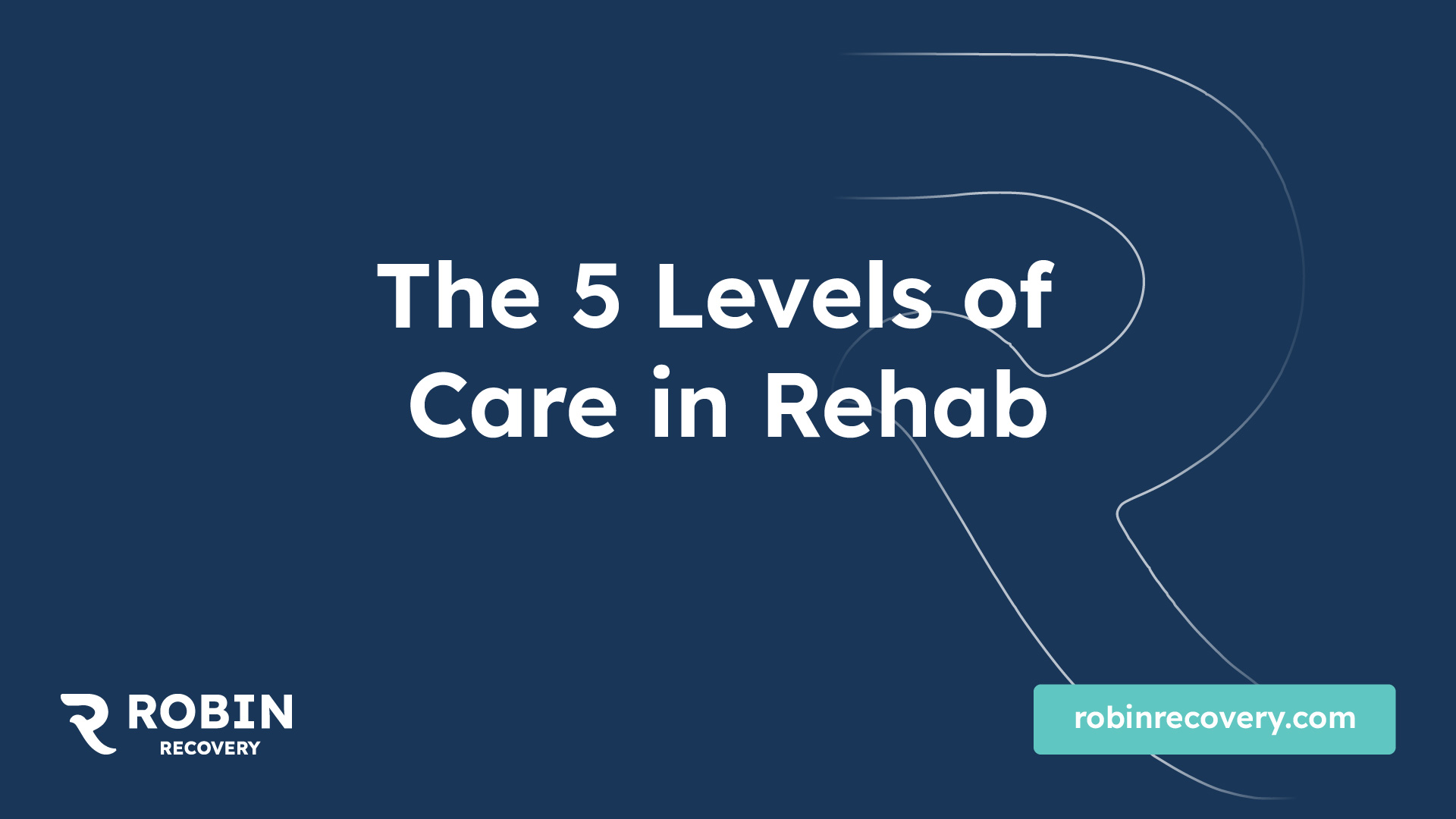The 5 Levels of Care in Rehab

Understanding Levels of Care in Rehab
Overview of ASAM Levels
The American Society of Addiction Medicine (ASAM) has classified five distinct levels of care in rehab to address the diverse needs of individuals struggling with addiction. Each level provides varying intensities and types of care, allowing for a flexible, tailored approach to addiction treatment. The five levels of care according to ASAM are as follows:
ASAM LevelDescriptionLevel 0.5Early Intervention ServicesLevel 1Outpatient ServicesLevel 2Intensive Outpatient Services (IOP) and Partial Hospitalization Programs (PHP)Level 3Residential/Inpatient ServicesLevel 4Medically Managed Intensive Inpatient Services
These levels ensure that treatment services match the severity of each individual's substance use disorder, offering everything from detoxification to intensive inpatient care [1].

Importance of Tailored Care
Tailored care in rehabilitation is crucial for effective recovery. Different individuals react to treatment in unique ways, influenced by factors such as the type of substance abused, duration of use, co-occurring disorders, and personal circumstances. The flexibility of the ASAM levels allows for this individualized approach, ensuring that the right resources are available at the right time.
For example, someone requiring immediate detoxification will need Level 4 care, while another person who has completed detox might benefit from Level 2 services such as IOP. Recognizing these different needs enhances the likelihood of achieving a successful and sustainable recovery journey. It is important for individuals and their families to understand these tailored options to make informed decisions regarding types of holistic health practices and support systems throughout the rehabilitation process.
Choosing the appropriate level of care involves assessing the individual's specific situation, including understanding the signs of addiction or substance abuse. This thorough evaluation aids in determining the most effective path for healing, ensuring that individuals receive the necessary attention and support as they progress through their recovery journey.
The Continuum of Care
Understanding the continuum of care is crucial for effective addiction treatment. This concept outlines the levels of care available, helping to ensure that individuals receive appropriate support as they progress through their recovery journey.
Progression Through Levels
The levels of care progress in a downward direction, starting with the more intensive services at level 4 and moving towards lower levels of care as treatment advances. This progression is essential for adapting to the changing needs of individuals as they recover. The goal is to provide the most suitable level of support at each stage.
LevelType of CareIntensity of Services0.5Early Intervention ServicesMinimal1Outpatient ServicesModerate2Partial Hospitalization (PHP)High3Residential/Inpatient ServicesVery High4Medically Managed Inpatient ServicesMaximum
This table illustrates the structure of the continuum, showcasing how services range from minimal support to intensive interventions. Each level is tailored to the intensity of services required for diagnosis and treatment, making it vital for effective healing.
Continuum Assessment
Assessing an individual's needs is an essential part of navigating the continuum of care. The 'Risk Levels' assessment within the ASAM framework evaluates various aspects of an individual's life. These dimensions help professionals determine the most appropriate level of care. Factors considered include:
After completing an assessment, individuals must be willing to adhere to the treatment recommendations provided. Seeking multiple opinions from behavioral health professionals can ensure that all options are thoroughly considered, allowing for a collaborative approach to recovery.
When individuals actively engage with their continuum of care, they have a greater chance of achieving sustained recovery and a healthier lifestyle. For more insights into the treatment process, explore our resources on the 5 levels of care in rehab.
The Five Levels in Detail
Understanding the five levels of care in rehab can significantly enhance the recovery journey for individuals dealing with substance use disorders (SUDs). Each level is designed to cater to different needs based on the severity of the condition.
Level 0.5: Early Intervention Services
Level 0.5, or Early Intervention Services, focuses on preventive measures for individuals who are at a high risk of developing a substance-related problem but do not yet have a diagnosable substance use disorder. This level provides educational resources highlighting the risks associated with substance use and offers strategies to avoid high-risk behaviors [3].
Key components of Early Intervention Services can include:
Service TypeDescriptionEducationInformation about the effects of substance use and addictionRisk AssessmentIdentifying behaviors that may lead to substance use disordersSupport GroupsPeer support for individuals facing similar challenges
Level 1: Outpatient Services
Level 1 Outpatient Services often serves as the first point of care for individuals with less severe substance use disorders. This level provides less than 9 hours of services per week, which may encompass various therapeutic approaches such as counseling, educational groups, and medication therapy [3].
The structure of Outpatient Services typically includes:
Service TypeDescriptionCounselingIndividual or group sessions focusing on behavioral changeEducational GroupsSessions designed to enhance knowledge about addictionMedication TherapyManagement of medications to assist in recovery
Both Level 0.5 and Level 1 play critical roles in the rehabilitation process, setting the foundation for long-term recovery and well-being. As individuals progress on their journey, additional levels may become necessary to meet more complex needs.
Exploring Mid-Level Care
Mid-level care in addiction treatment plays a vital role in providing the right support for individuals seeking recovery. This section focuses on two key options: Partial Hospitalization Programs (PHP) and Intensive Outpatient Programs (IOP), as well as standard outpatient therapy.
Level 2: PHP and IOP
Level 2 care includes both Partial Hospitalization Programs (PHP) and Intensive Outpatient Programs (IOP). These services offer a structured treatment environment while allowing individuals to maintain some degree of independence.
Type of ProgramHours of TreatmentKey FeaturesPHP20+ hours/weekIntensive therapy, daily support, structured environmentIOP9-20 hours/weekFlexible schedule, regular therapy sessions, engagement with daily responsibilities
Outpatient Therapy
Outpatient therapy is categorized as Level 1 care. It is less intensive, providing fewer than 9 hours of treatment per week for adults and under 6 hours for adolescents [4]. This option is suitable for individuals with less severe symptoms of substance use disorder or those transitioning from a higher level of care.
Outpatient therapy typically involves:
This level of care allows patients the flexibility to manage their daily lives while receiving crucial therapeutic support and monitoring progress as they continue their recovery journey.
For more information on various aspects of addiction treatment, including which disorders do benzos treat? and the benefits of drama therapy, explore the internal links provided.
Intensive Care Options
In the landscape of addiction treatment, intensive care options play a vital role for individuals requiring more structured and comprehensive support. Levels 3 and 4 address serious substance use issues and focus on providing the necessary care for recovery.
Level 3: Residential/Inpatient Services
Level 3 is characterized by Residential or Inpatient Services, which offer a structured environment where individuals live on-site and receive 24-hour supervision or care. This level is designed to help individuals break free from distractions and triggers that exist in their daily lives. The aim is to create a stable environment conducive to recovery [3].
FeatureDescriptionSettingResidential, on-site living accommodationsDurationTypically stays range from 30 to 90 days, depending on individual progressCare Level24-hour supervision and medical supportFocusIndividualized treatment plans, addressing both substance use and underlying psychological issues
The structured nature of Level 3 services allows individuals to participate in various therapeutic activities, including group therapy, individual counseling, and holistic approaches. Such comprehensive plans target both the physical and emotional aspects of recovery.
Level 4: Medically Managed Inpatient Services
Level 4 includes Medically Managed Intensive Inpatient Services. This level is designated for individuals with severe substance use disorders who require immediate medical stabilization. Patients receive 24-hour medical care in hospital settings, focusing on the stabilization of the patient's physical and mental health [3].
FeatureDescriptionSettingHospital-based treatment with intensive medical oversightDurationVaries based on individual medical needs; can be short-term or extendedCare LevelContinuous medical and clinical monitoring by healthcare professionalsFocusStabilization of physical health, detoxification, and psychiatric support
In this intensive level of care, a multidisciplinary team focuses on the medical and psychological complexities of addiction. This includes managing withdrawal symptoms, addressing co-occurring mental health disorders, and ensuring overall safety during the treatment process.
Understanding the 5 levels of care in rehab provides a clearer perspective on the options available for individuals at different stages of their recovery journey. Those in need of more intensive care, such as residential or medically managed services, can find the support necessary for their specific needs, enabling them to take essential steps toward healing. For further information on how these treatment levels can impact recovery, explore details about other levels in our article on the 5 levels of care in rehab.
References
[2]:
[3]:
[4]:
